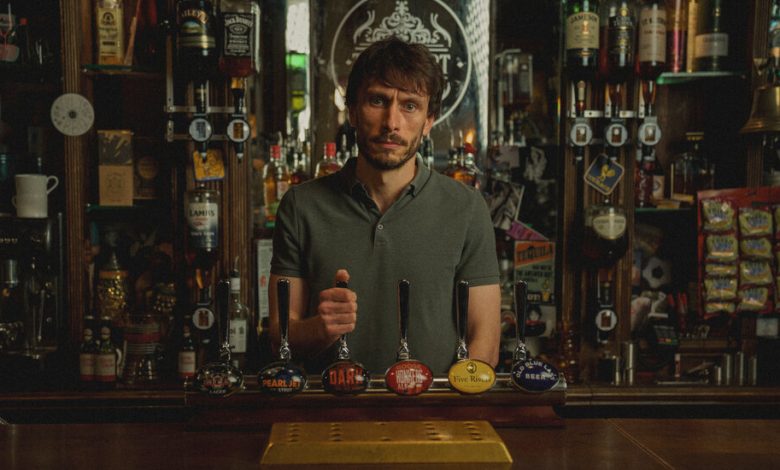Why Is ‘Baby Reindeer’ Such a Hit? It’s All in the Ending.

This article includes spoilers for all of “Baby Reindeer.”
The mini-series “Baby Reindeer” arrived on Netflix on April 11 without much advance hype, but it quickly became one of the most talked-about TV shows of 2024.
It’s not hard to understand why. Based on the Scottish comedian Richard Gadd’s award-winning 2019 one-man stage show, “Baby Reindeer” baits its hook in the first episode, which introduces Martha (Jessica Gunning), an emotionally fragile middle-aged woman who appreciates the kindness shown to her by Donny (Gadd), a struggling stand-up comic who offers her a free drink in the pub where he works.
By the end of that first episode, Martha’s neediness has begun to shade into creepiness. And by the time Donny discovers that his new friend has a history of stalking, she’s already begun what will eventually become a torrent of abuse, as she floods his email and social media with poorly spelled messages that insult his character and sometimes threaten sexual violence.
What makes “Baby Reindeer” so effective is that as Martha pushes further and further into Donny’s personal life — attending his comedy shows, befriending his landlady, calling his parents — the audience shares his mounting feelings of powerlessness and frustration, cut with flashes of pity for the woman who is ruining his life. The show has the “slow-motion train wreck” appeal of a twisty true-crime documentary, but balanced with empathy for two profoundly broken people.
A story as dark and uneasy as this one needs a proper ending, though. “Baby Reindeer” has one that is satisfying in its particulars, if haunting in its implications.
Gadd (who wrote every episode) plants the seeds for the finale in the penultimate episode, the sixth, which ends with Donny having a career-altering meltdown while competing in a stand-up comedy contest. Donny’s comic style is highly conceptual, involving corny props and awkward jokes, designed to leave his audience wondering whether or not they’re meant to laugh. He’s like a Scottish (and much less effective) version of Steve Martin in his “Wild and Crazy Guy” days. (Or, as Donny puts it: “I’m a comedian when they laugh, a performance artist when they don’t.”)
When the crowd can’t get on his wavelength at the competition, Donny ditches his props and just talks, sharing with a stunned audience the story that we have been watching for the previous five episodes. He tells them about how when he was a young and inexperienced comedian, he took an unpaid gig working for Darrien O’Connor (Tom Goodman-Hill), a well-respected TV writer who repeatedly drugged and sexually assaulted him. He tells them about his transgender girlfriend, Teri (Nava Mau), whom he’s too embarrassed to kiss in public.
And, of course, he tells them about Martha, the angel and the devil on his shoulders: sometimes telling him how sweet, funny and handsome he is, and sometimes calling him a weak-willed, talentless degenerate.
As the show’s seventh and final episode opens, a video of Donny’s train-wreck performance has landed on YouTube (under the title “Comedian Has Epic Breakdown”), bringing him viral fame and new opportunities. The pressure of that higher profile — coupled with Martha’s ceaseless string of threatening voice mail messages — prompts Donny to confide in his unexpectedly sympathetic parents about being raped. All of these confessions feel liberating.
Not too long after, one of Martha’s threats is dire enough to get her arrested — and eventually jailed. Gadd brings the conflict between Donny and Martha to a logical conclusion, with Martha finally acknowledging the harm she’s done by pleading guilty.
So Donny lives happily … but not for ever after. More like for a day or two.
The unsettling ambiguities of the “Baby Reindeer” epilogue — the real ending, which comes after Martha is safely locked away — are a big part of what has made the show a word-of-mouth hit.
First, Donny finds himself going back over Martha’s old messages, and turning every one of their past interactions into pieces of a puzzle that he then pins up on his wall — like a detective trying to crack a complicated case. His inquiry even leads him back to the doorstep of the man who molested him, where Donny falls into an old pattern of deference and eagerness to please.
Then, in the series’s knockout closing scene, a bartender gives a teary-eyed Donny a free drink, echoing what Donny once did for Martha. What makes Donny so upset? Take your pick: He’s still processing what Martha and Darrien have done to him. He’s furious with himself for not standing up to his abuser. He attained the fame he always craved and found that it didn’t solve his problems.
The final trigger comes when, as he listens to one of Martha’s old messages, he hears her explain that she always calls him “reindeer” because he reminds her of her the stuffed toy that comforted her during a rough childhood. For a moment, this former terrifying nuisance goes back to being a person worthy of understanding and even grace. Or maybe, again, it’s actually empathy: Donny ending the story in the same state in which he first encountered Martha makes manifest the bond between them.
Part of the global popularity of “Baby Reindeer” is no doubt a result of the web sleuth dimension — the online rush to identify the real figures behind Martha and Darrien. Gadd has discouraged such speculation, and innocent people have been accused.
But much of the show’s distinctive appeal comes from how, at a time when trauma narratives almost have become cliché in high-end TV drama, “Baby Reindeer” presents a more nuanced version of one. It authentically depicts trauma and mental illness as confusing, unpredictable and deeply personal, all of which is underscored by the emotional ambivalence of its conclusion.
“Baby Reindeer” relies a lot on its subjective point of view. Donny’s voice-over narration dominates every episode, recounting in vivid detail his disgust with himself. The series’s two directors, Weronika Tofilska and Josephine Bornebusch, often keep the camera trained on Donny’s face, capturing his feelings of disorientation as even his best moments are disrupted by Martha’s constant intrusions. Viewers are drawn deep into Donny’s neuroses, which include, he and we begin to understand, an addiction to being the object of one woman’s obsession.
But while this show holds close to Donny’s perspective, in a way it also sees the world through Martha’s eyes — or at least to the extent that Donny identifies with her. She’s out of his life by the end of the finale, but he still has to live with that part of himself that feels exactly how she feels.
Throughout “Baby Reindeer,” Donny struggles to explain why he’s not more proactive when it comes to Martha. Why doesn’t he warn his friends about her? Why does he take so long to get the police involved? Why doesn’t he freeze her out the first time she turns weird?
The answer is that, on some level, he gets it. He too is lost, lonely and awkward much of the time. That’s why there is no real triumph in besting Martha. For Donny, it’s like defeating himself — something he already does nearly every day.



